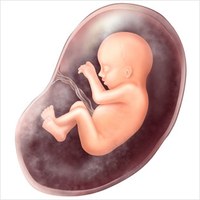Malaria infection has an adverse impact on both the mother and the offspring, some of them due to the capacity of malaria parasites to sequester in the placenta, resulting in placental malaria. The prevalence of the latter in sub-Saharan Africa is between 26 - 38%.
Epigenetic & Trancriptional Correlates of Placental Malaria & Impact on Neonatal & Infant Immunity

Professor Nabeel Affara and his research colleagues in MRC Gambia are interested in understanding better the risk placental malaria can have on new-borns and their mother. Subsequent side affects of the disease may be underdeveloped immunity and poor response to vaccination with the knock effects this may have on early development. Where malaria transmission is stable, primigravidae are more at risk of infection and its adverse outcomes. These include increased maternal mortality and severe anaemia, stillbirth, intrauterine growth retardation and low birth weight new-borns that have a higher risk of dying before their first birthday.
Independent of low birth weight, there is also an impact on infant growth, anti-malarial immunity, (higher) risk for other infections and on their immunity protection in general. These findings indicate the establishment of a long term post birth effect that appears to have its origins while the embryo/foetus is exposed in the womb to the malaria infection affecting the mother. In placental malaria, malarial parasite infected red blood cells accumulate in the placenta by sticking to the inner surface of the placenta where the mother and foetus connect their blood supplies. This affects nutrition of the foetus and leads to low birth weight. In addition, there are effects on growth and the way in which the immune system operates in the newborn and later the infant. This is shown by these children being more prone to any infection, infection by the malaria parasite and by changes in the way they are protected by routine vaccinations. These observations of altered nutrition during gestation and compromised immunity and growth after birth suggest that early exposure to malaria parasite, through placental malaria, may induce changes in the foetus that have a long term impact after birth.
Professor Affara and his colleagues suggest that this may be brought about by processes that alter how genes work (by bringing about chemical modifications of the genetic material) in the placenta that affect its function, leading to under nutrition of the foetus and low birthweight. Additionally, the same mechanisms can set a pattern of gene activity that affects growth in the newborn and development of the immune system and protection over the early infant period. The team wishes to establish whether these modifications of the genetic material in the placenta and newborn occur, what genes these affect and how their activity is altered and relate this to genetic pathways that are important in the function of the placenta and developing immune system in infants.
Understanding these genetic pathways offers possible insights into how infections in the mother during gestation can affect infant health in general after birth and specifically the development of their immune protection. Such understanding may allow interventions that could help to counteract the adverse effects on the newborn and infant immune systems brought about by prior exposure to placental malaria.
Key Publications
1. Khulan B, Cooper WN, Skinner BM, Bauer J, Owens S, Prentice AM, Belteki G,Constancia M, Dunger D, and Affara NA (2012). Periconceptional maternal micronutrient supplementation is associated with widespread gender related changes in the epigenome: a study of a unique resource in the Gambia. Hum Mol Genet. 21(9):2086-101.
2. Cooper WN, Khulan B, Owens S, Elks CE, Seidel V, Prentice AM, Belteki G, Ong KK, Affara NA, Constância M, Dunger DB (2012). DNA methylation profiling at imprinted loci after periconceptional micronutrient supplementation in humans: results of a pilot randomized controlled trial. FASEB J. 26(5):1782-90.
3. Quilter CR, Sargent CA, Bauer J, Bagga M, Reiter C, Hutchinson E, Southwood O, Evans G, Mileham, A, Griffin D and Affara NA(2012). An association and haplotype analysis of porcine maternal infanticide: A model for human puerperal psychosis? Am. J. Med. Genet., B Neuropsychiatr. Genet. 159B, 908-927.
4. Cocquet J, Ellis PJI, Mahadevaiah, SK, Affara NA, Vaiman D and Burgoyne P (2012). A genetic basis for a postmeiotic X vs, Y chromosome intragenomic conflict in the mouse. PLoS Genetics, 8(9):e1002900
5. Skinner, BM, Lachani K, Sargent CA, Affara, NA (2013). Regions of XY homology in the pig X chromosome and the boundary of the pseudoautosomal region. BMC Genetics, Jan 15;14:3. doi: 10.1186/1471-2156-14-3.
6. Quilter CR, Cooper WN, Cliffe KM, Skinner BM, Prentice PM, Nelson L, Bauer J, Ong KK, Constância M, Lowe WL, Affara NA, Dunger DB. Impact on offspring methylation patterns of maternal gestational diabetes mellitus and intrauterine growth restraint suggest common genes and pathways linked to subsequent type 2 diabetes risk. FASEB J. 2014 Nov;28(11):4868-79. doi: 10.1096/fj.14-255240. Epub 2014 Aug 21. PubMed PMID: 25145626.

